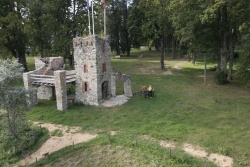Author: airBaltic.com
Source: airBaltic.com
Today, already the 27th group of 15 students began their professional pilot studies at the airBaltic Pilot Academy of the Latvian national airline airBaltic. They aim to receive a commercial pilot license upon completing the full-time airline transport pilot program.
Pauls Cālītis, Interim CEO of airBaltic: “It is a pleasure to welcome the new group of students – the first of this academic year. Their decision to take on this path highlights the growing need for highly skilled aviation professionals. Moreover, this beginning comes at a symbolic moment, as airBaltic celebrates its 30th anniversary – a milestone that underlines our long-standing role in developing aviation in the region. Each new class of cadets is another step in preparing the next generation of pilots who will carry forward airBaltic’s growth and the future of aviation.”
Reklāma
The new group includes students from Latvia, Lithuania, Sweden, Finland, Germany, and France.
There are 174 active students at the airBaltic Pilot Academy at the moment. Most of them are from the Baltic countries, however, there are students also from other EU countries such as Denmark, Germany, France, Finland, Spain and Italy among others. Overall, more than 10% of airBaltic Pilot Academy students are female.
Over the years, 138 graduates of the airBaltic Pilot Academy have become employees of the airline – most of them now flying as First Officers, with several also taking on roles as training instructors. Notably, last month the academy reached a new milestone as its very first graduate, Kaspars Kasakovskis, successfully completed his Captain upgrade, becoming the first Pilot Academy alumnus to serve as a Captain at airBaltic. This achievement demonstrates the strength of the program and the clear career path from cadet to Captain.
Students of the airBaltic Pilot Academy have to cover the costs of ATPL theory studies and 45 flight hours, at a cost of EUR 25 000. After passing airBaltic pilot assessment and becoming an employee of the company, the airline will provide financing (loan) for the rest of the studies.
Additionally, for more than a year now, airBaltic has expanded its training capabilities with its second Airbus A220 full flight simulator. This state-of-the-art addition significantly improves the airline's capacity to train and maintain the qualifications of its growing team of pilots, supporting both the expansion of its fleet and the ongoing development of the Pilot Academy. It also provides young pilots with the opportunity to learn and practice using the latest, industry-leading technology – right from the start of their journey.
More information about the Pilot Academy: www.pilotacademy.com.
To publish this article please contact BalticTravelnews.eu editorial board






.jpeg)


